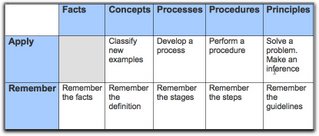Final Blog Relections
One of my goals in blogging about my experiences on the reference desk at Woodward was to use the blog as a way of reflecting on my experiences and revisiting interesting and/or challenging questions to get as much benefit as possible from my experience.
Another course I am taking uses the content-performance matrix (pictured below) to distinguish among the five levels of content and two levels of performance. The matrix was created to help trainers develop materials that focus on the application level, rather than the remember level.
Much of what happens at the reference desk falls into the category of “perform a procedure” and “solve a problem/make an inference”. This has application to both the learning I’ve been doing in LIBR 534 and the training we do as librarians, both formally in instructional classes, and informally when patrons ask us questions. The aim is to produce searchers who can not only remember what we teach them, but actually apply it when faced with a reference problem that is different from the practice examples we have used in instruction.

Working on the reference desk this term has provided weekly review lessons in applying the various concepts, processes, procedures, and principles we’ve studied.
Another course I am taking uses the content-performance matrix (pictured below) to distinguish among the five levels of content and two levels of performance. The matrix was created to help trainers develop materials that focus on the application level, rather than the remember level.
Much of what happens at the reference desk falls into the category of “perform a procedure” and “solve a problem/make an inference”. This has application to both the learning I’ve been doing in LIBR 534 and the training we do as librarians, both formally in instructional classes, and informally when patrons ask us questions. The aim is to produce searchers who can not only remember what we teach them, but actually apply it when faced with a reference problem that is different from the practice examples we have used in instruction.

Working on the reference desk this term has provided weekly review lessons in applying the various concepts, processes, procedures, and principles we’ve studied.
